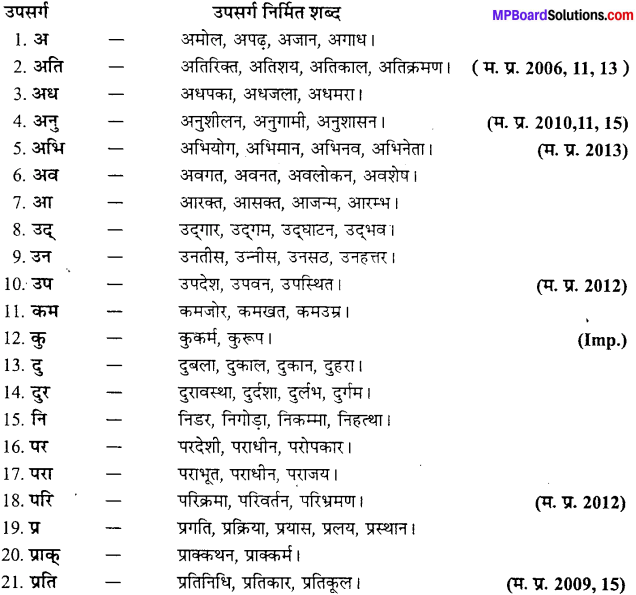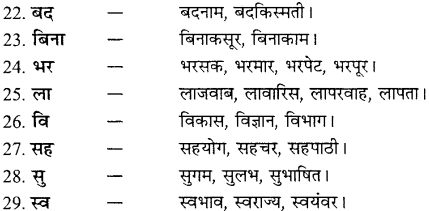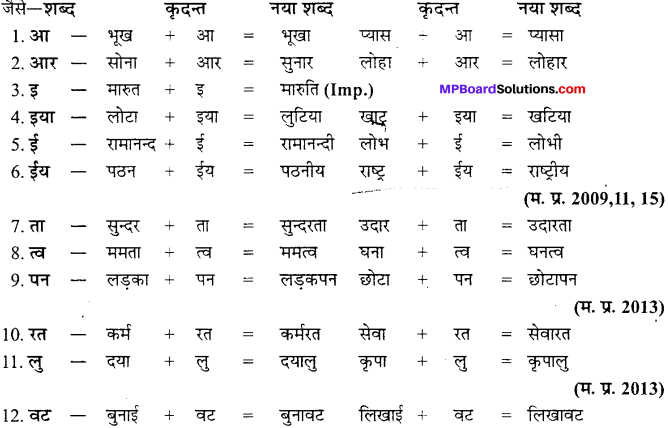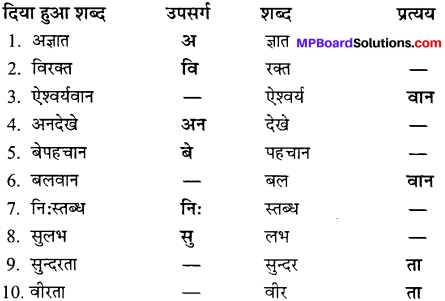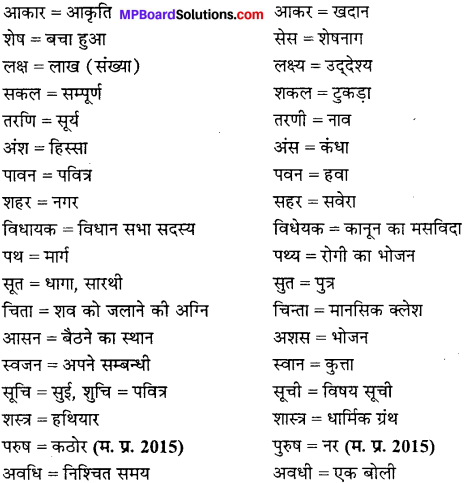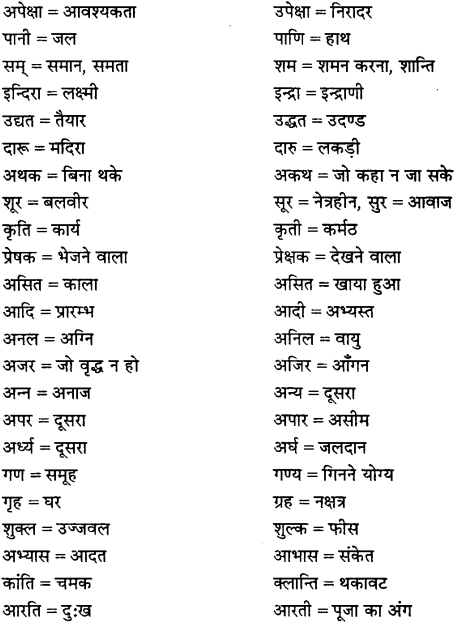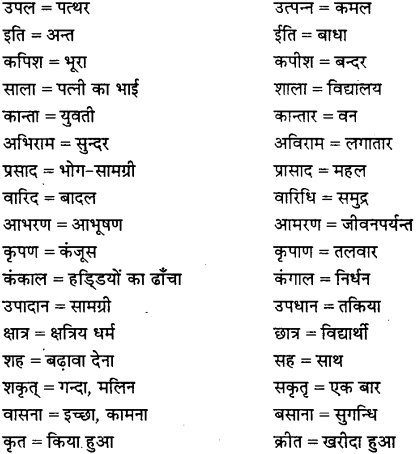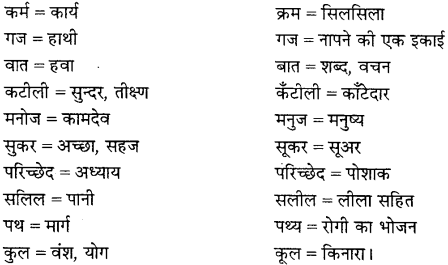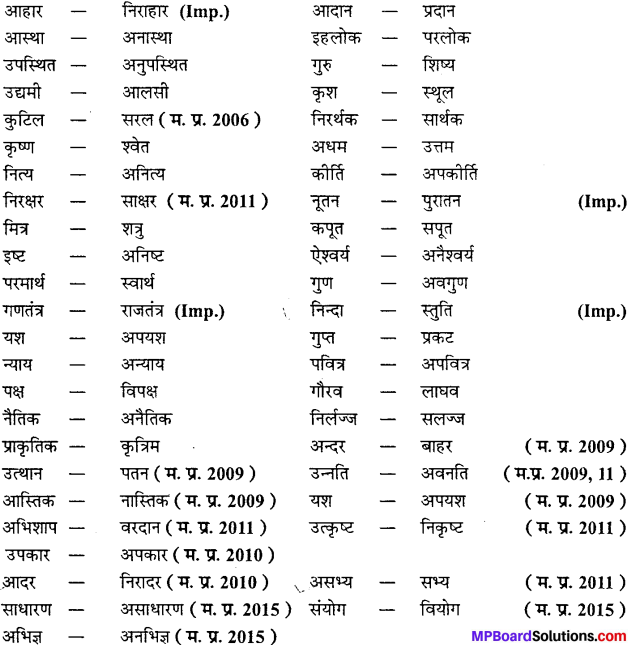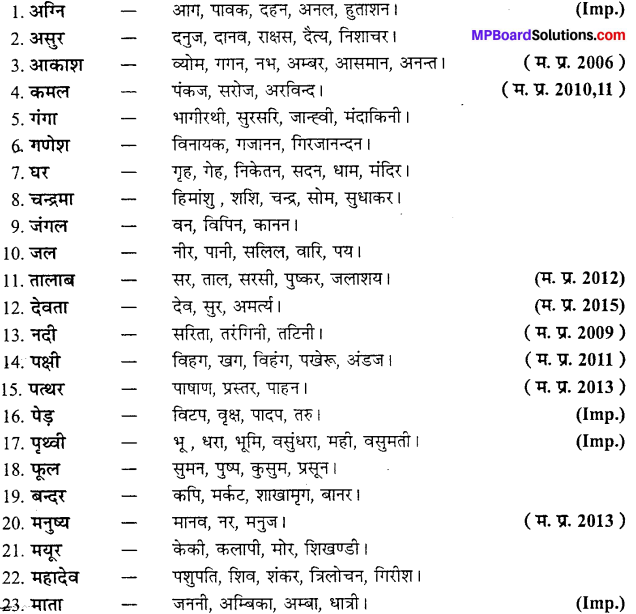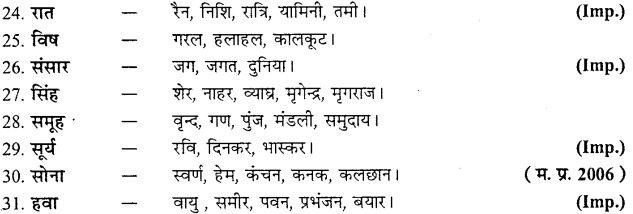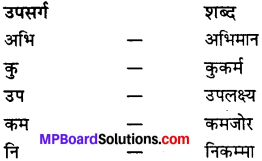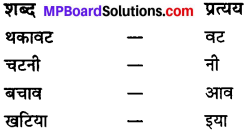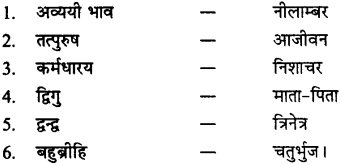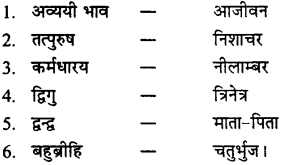MP Board Class 11th Special English Poems Important Questions
MP Board Class 11th Special English Chapter 1 Patriotism Important Questions and Answers
I. Read the following stanzas carefully and answer the questions given below : [M.P. 2015]
1. Breathes there the man with soul so dead,
Who never to himself hath said,
“This is my own, my native land! ”
Whose heart hath never within him burn’d,
As home his footsteps he hath turn’d,
From wandering in a foreign strand!
![]()
Questions :
(i) What meaning does the word ‘breathe’ convey?
(ii) Whose soul does the poet say is dead?
(iii) What does the poet imply by ……….. As home his footsteps he hath turned’?
(iv) Who has composed this poem?
(v) Find the antonyms the words ‘alive’ and ‘native’ from the lines given above.
Answers :
(i) The word ‘breathe’ stands for a person who is alive.
(ii) A person who does not love his native land.
(iii) Returning home.
(iv) Sir Walter Scott.
(v) Alive – dead, Native – foreign.
2. Despite Those titles, power and peef, [M.P. 2013]
The wretch, concentred all in self,
Living, shall forfeit fair renown?
And doubly dying shall go down.
Questions :
(i) Who is a ‘wretch’?
(ii) Why does the poet says the powerful man will lose his reputation?
(iii) Explain the meaning of the expression ‘doubly dying’
(iv) Find the word in the stanza similar in meaning of
(a) money, (b) lose.
Answers :
(i) A ‘wretch’ is a man who does not love his native land.
(ii) The poet says this because a man without love for his native land does not deserve any power.
(iii) The expressions ‘doubly dying’ means that a man without patriotic feeling is almost dead and after his real death no one remembers him. It is another death.
(iv) (a) pelf, (b) forfeit.
II. Answer the following questions in one sentence :
Question 1.
Whose soul does the poet say is ‘dead’?
Answer :
The soul of one who has no love for his native land is ‘dead’.
Question 2.
Who does the poet ask to mark well?
Answer :
One who does not love his native land.
Question 3.
What delights the minstrel?
Answer :
The return of a patriotic person to his motherland delights the minstrel.
Question 4.
How can a person doubly die? (Imp)
Answer :
An unpatriotic man is almost dead and after his real death no one remembers him which is another death.
Question 5.
What is meant by ‘vile dust?
Answer :
“Vile dust is used in the sense that is given birth to a person without love for his native land.
III. Answer the following questions in 100 to 150 words :
Question 1.
What happens to a person who returns home from a foreign land? (M.P. 2012)
Answer :
The return of a person from a foreign land is a matter of great joy. It is his love and attraction to his native land that brings him home. He feels proud. He is confident and proudly declares that ‘this is my home, my native land all the time. He feels delight of his feeling and love for nation. People welcome him with all pride and pleasure. The minstrel entertains him with all his art and skill. He is given honour and name and fame. He becomes an ideal man. He makes his country great. He brought all laurels for his native land. Such a person becomes a role model. The nation feels proud to have such a patriotic son of the soil.
Question 2.
What does the poet mean by ‘for him so minstrel raptures swell’?
Answer :
The poet in this poem deals with the theme of patriotism. He feels that a man who loves his country is great. He is the real son of the soil. The poet hardly believes that there would be anyone who has no love for his native land. There is perhaps no one whose soul is not ecstatic at the feeling of his land. A person with such a feeling of love for nation is worthy of all our praise and honour. Whenever he returns home after wandering from foreign lands, he is welcomed warmly. But the man with no such feeling is a bad name for the nation. He does not deserve any praise or honour. No minstrel tries to praise him or honour him.
Question 3.
Write a note to justify the title of the poem.
Answer :
The poem Patriotism deals with the similar theme of patriotism. All through the poem, the poet talks about the man who has love for his native land. Such a man gets praise and position everywhere. Minstrels honour him with all pleasure. Even after his death he is remembered forever. His death becomes a national mourning. The poet also talks about the person who has no patriotic feeling for his nation. Such a man does not deserve any praise. Despite his power and position, he lives unknown and dies unnoticed. No one weeps for him. As the poem only present the aspects of patriotism, the title becomes appropriate.
Question 4.
What are the attributes of a patriot? (M.P. 2009)
Answer :
A patriot deserves all kinds of honour and affection. He is given high respect by his countrymen. If he comes back from foreign countries, he is worthy of reputation. If he comes back from foreign countries, he is warranty received by them. Minstrels praise him highly in their notes. Even after death, he is paid tribute by weeping countrymen. The people of entire nation remember his death. Poets admire him through poem. The writers praise him in their essays and volumes. He never dies unwept, unhonoured and unsung.
![]()
MP Board Class 11th Special English Chapter 4 The Brook Important Questions and Answers
I. Read the given extracts from the poem carefully and answer the questions given below:
1. I come from haunts of coot hern;
I make a sudden sally
And sparkle out among the fern,
To bicker down a valley.
Questions :
(i) What is the birth place of the brook?
(ii) What type of poem is it?
(iii) What does the word bicker point out?
(iv) Name two water birds mentioned in the passage?
(v) How does the brook come out after its birth?
Answers :
(i) The birth place of the brook is actually the haunt of water birds like coot and hern.
(ii) It is an autobiographical poem.
(iii) The word bicker point out the noise created by the brook when it flows.
(iv) The two water birds mentioned are coot and hern.
(v) The brook gushes out in a sudden sally after its birth.
2. I chatter over stony ways,
In title sharps and trebles,
I bubble into eddying bays,
I babble on the pebbles, (Imp)
Questions :
(i) What does the word “heater points out”?
(ii) What difference do these two words ‘bubble’ and ‘babble’ point out?
(iii) Choose the word which point outs movement and one word which points out sound?
(iv) Choose an aliteration from the stanza.
(v) What figure of speech is used in the stanza.
Answers :
(i) The word ‘chatter’ points out that while passing over the stony ways it is creating heavy noise.
(ii) The word bubble points out that when the brook flows in the spiral movement of water its noise is lost. But when it strikes on the pebble it
produces a high pitched sound as if expressing its happiness.
(iii) The word which points out movement is bubble and the word which points out sound is babble.
(iv) The aliteration used in ‘bubble-bays’.
(v) In this poem brook has been personified. Brook has been indicated as a human being.
3. I slip, I slide, I gloom, I glance
Among my skimming swallows
I make the netted sunbeam dance
Against my sandy shallows. (Imp)
Questions:
(i) Which words points out its carefree nature?
(ii) What does the word ‘netted’ point out?
(iii) How is ‘I responsible for making sunbeam dance?
(iv) Explain the picturesque view of the stanza in a sentence or two.
Answers :
(i) The carefree nature is pointed out by the words: slip, slide, gloom, galnce.
(ii) The word ‘netted’ means captured.
(iii) The brook is making the rays of its sun to flicker light on its flowing water. It seems as if the sun rays are dancing on the brook.
(iv) The brook passes along the shallow by filtering along the sun rays falling on it.
4. Tilt last by Philips farm
I flow To join the brimming river.
For men may come and men may go
But I go on for ever (Imp)
Questions :
(i) What does it cross before reaching teh phillips farm?
(ii) What does the expression brimming river point out?
(iii) What paralletism does this poem have with man?
(iv) What lesson there lines teach you?
(v) Choose a word which means ‘full’.
Answers :
(i) Before reaching the philips farm it eroses the hills, ridges, towards and bridges.
(ii) The enpression brimming river point out that the river is overflowing with water as the brook brings walis in it.
(iii) The parallelism that this poem have with man is that men may go but the brook keeps on flowing for ever.
(iv) These lines teach us a lesson that we should be strong and determined.
(v) ‘Brimming is the word which means “Full’. II. Answer the following questions in two or three sentences each :
![]()
Question 1.
Who is the ‘l’ in the poem and what does he do throughout the poem?
Answer :
The ‘I’ in the poem is the stream. He flows and flows throughout the poem and never stops.
Question 2.
Identify the places that the brook travels through. Make a list of the items.
Answer :
A list of the items :
- thirty hills
- twenty hamlets
- fifty bridges
- philip’s form
- many fields and fallows
- many lawns and grassy plots.
Question 3.
Where does the brook flow to an what happens in the end? (Imp)
Answer :
The brook flows to the river. Along with the river water it continues its movement on forever.
III. Explain the following:
(i) For men may come and men may go,
But I go on forever.
Answer :
Generation after generation of men come and die but the brook continues to flows forever. The movement of brook is a never-ending process. It means that men may come and go but the world goes on as ever.
(ii) I chatter over stony ways,.
In little sharps and trebles
I bubble into eddying bays
I babble on the bays.
Answer :
The brook is a small stream. It creates tremendous noise where it passes over the stony ways. When it flows in the circular movement of water its noise is reduced. But when it strikes in the pebble it produces shall sound as if expressing its happiness.
(iii) What is the poet referring to when he says:
And draw them all along, and flow
To join the brimming river.
Answer :
The poet explains the onward movement of the brook which moves on and on to join the brimming river. All over its way it crosses and meets with many foamy flakes, silver water-break, golden gravel. It takes them all with its flow and gives them too a larger meaning to their existence.
MP Board Class 11th Special English Chapter 6 Cherry Tree Important Questions and Answers
I. Read the following stanzas carefully and answer the questions that follow them :
1. Since I placed my cherry seed in the grass, (Imp)
“Must have a tree of my own, I said,
And watered it once and went to bed
And forgot.
Questions :
(i) Who is ‘I’ in these lines?
(i) What did ‘l’ do eight years ago?
(iii) Why did ‘I’ do so?
(iv) What did ‘I’ do after that?
(v) Give a word from the stanza which is opposite to ‘remembered’.
Answers :
(i) ‘I’ in these lines is the poet-the narrator.
(ii) l’ placed a cherry seed in the grass eight years ago.
(iii) ‘I’ did so thinking it to be a tree of his own.
(iv) ‘I’ watered it once and then forgot it.
(v) ‘Forgot’.
2. Goats ate the leaves, the grass cutter’s scythe
split it apart and a monsoon blight
Shrivelled the slender stem …………. Even so.
Questions :
(i) What is being talked about her in these lines?
(ii) What did the goats do to it?
(iii) What did the monsoon blight do to the tree?
(iv) How was the tree split apart?
(v) Give a word from the above stanza similar in meaning to ‘thin’.
Answers :
(i) A little cherry tree is being talked about here.
(ii) The goats ate the leaves of the tree.
(iii) The monsoon blight made its stem shrivelled and slender.
(iv) The tree was split apart by the grasscutter’s scythe.
(v) ‘slender’.
![]()
3. Eight years have passed
Since I placed my cherry seed in the grass.
“Must have a tree of my own,’ I said,
And watered it once and went to bed
And forgot, but cherries have a way of growing,
Though no one’s caring very much or knowing.
Questions
(i). Where did the poet plant the cherry seed?
(ii) Why did he do so?
(iii) What mistake did he commit?
(iv) What does the poet mean byʻ….cherries have a way of growing?
(v) Find the antonyms the words “remembered’ and ‘little’ from the lines given above.
Answer:
(i) The poet planted the cherry seed in the grass.
(ii) He wanted to have a tree of his own.
(iii) He forgot to water the plant.
(iv) Unlike other plants which require constant care, cherries grow unattended. –
(v) remembered = forgot, little = much.
II. On the basis of the reading of the poem, answer the questions :
Question 1.
What difficulties did the cherry tree face in growing up? (Imp)
Answer :
The difficulties that the cherry tree faced in growing up were that: he it was not watered. It was suppressed by the tall, wild grass, Goats often ate up its leaves. Grasscutter scythe it and split it apart.
Question 2.
What is the miracle? How was it caused by time and rain? (Imp)
Answer :
The miracle is something that is thought to be done by some divine or super natural power. Here, time and rain caused the growth and bloom of the cherry tree despite all its difficulties.
Question 3.
What does the poet refer to in ‘five month’s child?
Answer :
The poet refers to the cherry tree as ‘five month’s child.
Question 4.
The poet says, Its arms in fresh fierce lust’. What do ‘Its arms’ stand for?
Answer :
Its are stand for the branches of the cherry tree.
Question 5.
Mention two things that the poet saw when he was trying to look at the sky through the leaves of the cheery tree.
Answer :
The two things that the poet saw when he was trying to look at the sky through the leaves of the cherry tree were.
(i) The finches which flew and flitted.
(A) What is the poet trying to say in the expression ‘cherries have a way of growing? (Imp)
Answer :
By the expression cherries have a way of growing the poet means to say that cherry is tree and hence a natural object. Nature has its own way to protect its world. So, despite all hurdles the cherry tree grows and blooms. There is no power which can stop the process of nature.
(B) What do you understand by the following expression?
Write a sentence for each expression to bring out its meaning :
1. grass running wild
2. monsoon blight
3. growing pains
4. sleepiest breeze
5. dappled green
6. blue blind sky
7. fresh fiercest lust.
Answer :
1. Grass running wild : The cherry tree is covered with grass that has grown on it.
2. Growing pains : The monsoon blight has adversely affected the growth of the plant.
3. Growing pains : I was very much depressed at the growing pains at every step.
4. Sleepiest breeze : The sleepiest breeze soothed my hurt feelings.
5. Dappled green : It was strange to see the bees drinking nectar through dappled green.
6. Blue blind sky: The blue blind sky fascinated me.
7. Fresh fierest lust : No fresh fierest lust could affect my way.
III. Objective Type Questions :
Choose the correct answer from the giving options :
(i) The poem ‘Cherry Tree’ has been composed by:
(Ruskin Bond, P.B. Shelley, William Wordsworth, None of these)
(ii) The poet compares the small cherry plant with a :
(kid, young boy, an adult person, five month child)
(iii) The poet loves the cherry tree very much and call it :
(the national tree, the international tree, the tree of his own)
![]()
(iv)“Shrivelled the slender stem …………. Even so” is the example of:
(simple metaphor, alliteration, none of these)
Answers :
(i) Ruskin Bond.
(ii) five month child.
(iii) the tree of his own.
(iv) alliteration
MP Board Class 11th Special English Chapter 7 Mercy Tree Important Questions and Answers
I. Read the following stanzas carefully and answer the questions given below :
1. The quality of mercy is not strained; (M.P. 2009, 11)
It droppeth as the gentle rain from heaven
Upon the place beneath. It is twice blest
It blesseth him that gives, and him that takes.
Questions :
(i) What is talked about in these lines?
(ii) How does the poet qualify, mercy?
(iii) For whom is the mercy a bliss?
(iv) Give a word from the stanza similar in meaning to ‘forced’.
Answers :
(i) Mercy is talked about here in these lines.
(ii) The poet qualifies mercy as gentle rain from heaven.
(iii) Mercy is a bliss both for the giver and the taker.
(iv) Strained.
2. It is enthroned in the hearts of kings,
It is an attribute to God himself.
And earthly power then show likest God’s
When mercy season’s life……….
Questions :
(i) What does mercy do with the king?
(ii) What is mercy?
(iii) When it becomes a divine grace?
(iv) Give a word from the above stanza which is opposite in meaning to dethroned.
Answers :
(i) Mercy is enthroned in the hearts of kings.
(ii) Mercy is an attribute to God. It is unearthy power.
(iii) It becomes divine grace when combined with justice.
(iv) To enthroned.
II. Write answer of the following questions in one sentence :
Question 1.
But mercy is above this sceptred sway. Explain.
Answer :
It is above the sceptred sway because it is enthroned in the hearts of the kings.
Question 2.
Why does the poet believe that ‘earthly power then show likest God’s when mercy seasons justice…….?
Answer :
The poet tells so because it appears to be God when it administers justice.
Question 3.
His scepter shows the force of temporal power,
The attribute to awe and majesty,
(a) What is an attribute to awe and majesty?
(b) What does show the force of temporal power?
Answer :
(a) An attribute to awe and majesty is force.
(b) The scepter shows the force of temporal powers.
Question 4.
It droppeth as the gentle rain from heaven.
Upon the place beneath. It is twice blest.
It blesseth him that gives, and him that takes.
(a) What is mercy compared above lines?
(b) How is mercy twice-blessed.
Answer :
(a) Mercy is compared with the gentle rain that drops from heaven. :
(b) Mercy is double blessings. On the one hand, it is a boon for the one who gives and a blessing for the other who takes.
III. Write the answer to the following questions in two or three sentences each :
Question 1.
What is the quality of mercy?
Answer :
Mercy is a super divine power. It is not a binding obligation but self-generating thing.
Question 2.
What makes mercy twice-blessed?
Answer :
On the once hand mercy falls upon the giver as a gift of God and on the other it obliges the taker.
![]()
Question 3.
What does quality a monarch more-mercy or throne, Why?
Answer :
It is mercy that qualifies a monarch more. A monarch, by showing mercy, can win the hearts of his subjects.
Question 4.
What does the scepter show?
Answer :
It shows the force of temporal power.
Question 5.
What is an attribute of God himself?
Answer :
It is mercy itself.
Question 6.
What happens when mercy is tempered with justice?
Answer :
When mercy is tempered with justice, it becomes divine.
IV. Write answer to the following questions in about 150 words :
Question 1.
How does mercy bless the giver and the taker alike? (Imp)
Answer :
Mercy is a human virtue. When combined with justice, it becomes divine grace. Then it transcends worldly power. One who shows mercy finds himself in a state of fulfilment. In this way Mercy blesses the giver and the taker alike.
V. Objective Type Questions :
Choose the correct answer from the giving options :
(i) The poem “Mercy’ has been composed by: [M.P. 2013]
(John Keats, William Shakespeare, P.B. Shelley, S.T. Coleridge)
(ii) The poem “Mercy’ is an extract from Shakespeares :
(The merchant of Venice, Mid Summer Nights dream, Othello, Twelfth Night)
(iii) “It dropeth as the gentle rain from heaven”. It is an example of:
(an alliteration, simple, personification)
(iv) According to the poet’s view mercy is :
(British quality, divine quality of man, rare quality, the quality of every living being)
Answers :
(i) William Shakespeare.
(ii) The merchant of Venice.
(iii) Alliteration.
(iv) Divine quality of man.
MP Board Class 11th Special English Chapter 9 To a Skylark Important Questions and Answers
I. Read the following stanzas carefully and answer the questions given below :
1. Hail to thee, blithe spirit !
Bird thou never wert
That form heaven or near it
Pourest they full heart
In profuse strains of unpremeditated art.
Higher still and higher
From the earth thou springest, like a cloud of fire,
The blue deep thou wingest,
And singing still does soar and soaring ever singest.
Questions :
(i) Who is ‘Thee’ in these lines?
(ii) What does the poet mean by ‘blithe spirit?
(iii) What does the bird do?
(iv) From where does the bird spring and where does it go?
(v) Find a word from the lines which means same as “unplanned’.
Aņswers :
(i) ‘Thee’ is the skylark (a bird).
(ii) The poet means a carefree and light-hearted bird.
(iii) The bird spring from the earth and it goes higher and higher in the sky.
(v) ‘Premeditated’.
2. Like a high-born baliin
In a palace tower,
Soothing her love-laden
Soul in secret hour
With music sweet as love, which overflows her bower
Like a glow-worm golden
In a dell of dew,
Scattering unbeholden
Its aerial hue
Among the flowers and grass which screen it from the view :
![]()
Questions :
(i) Who does the poet compose with the bird in the first given stanza?
(ii) What does she do?
(iii) What is the effect of her music?
(iv) What is composed with in the second stanza given here?
(v) Find a word from the above stanzas which is similar in meaning to ‘invisible’.
Answers :
(i) The bird is compared with a high-born maiden.
(ii) She soothes her love-laden soul.
(iii) Her music overflows her power.
(iv) Here, the bird is compared with glow worm.
(v) ‘Unbeholden’.
3. Teach us, sprite or bird,
What sweet thoughts are thine :
I have never heard
Praise of love or wine
That panted forth a flood of rapture so divine.
Chorus hymeneal,
Or trimumphal chant,
Match’d with thine would be all
But an empty vaunt
A thing wherein we feel there is some hidden want.
Questions :
(i) What does the poet ask the bird to teach him?
(ii) What has the poet never heard?
(iii) What is chorus?
(iv) What does the poet guess in the bird’s song?
(v) Give a word from the above stanzas which is similar in meaning to victory’.
Answers :
(i) The poet asks the bird to teach him the secret of its song.
(ii) The poet has never heard a song as sweet and divine as that of the bird.
(iii) Chorus is givup song.
(iv) The poet guesses that there is some hidden want in the bird’s song.
(v) triumphal’.
4. We look before and after, (M.P. 2010) (Imp)
And pine for what is not
Our sincerest laughter With some pain is fraught;
Our sweetest songs are those that tell of saddest thought.
Questions :
(i) What human weakness that the poet finds in these lines?
(ii) What does the poet mean by ‘sincerest laughter’?
(iii) What are our sweetest songs?
(iv) Give the opposite word from the above stanza for “enjoy’.
Answers :
(i) The poet finds that human being looks before and after and feels sad for what is not.
(ii) By “sincerest laughter’ the poet means extreme happiness.
(iii) Our sweetest songs are those that express our saddest thought.
(iv) ‘pine’.
II. Answer the following questions briefly :
Question 1.
Why is Shelley not able to define the Skylark? How does the Skylark exceed the capacity of human language to describe its qualities or the qualities of its song? (M.P. 2015, Imp)
Answer :
Shelley finds himself unable to define the Skylark exactly. It is because the Skylark is not seen. It is carefree and cheerful bird without any physical frame. Its spontaneous overflow of song creates mysteries in the mind of the poet. Its song pervades the entire universe. Unlike human being it is never sad. In this sense it surpasses us.
Question 2.
Why does the poet use the similes in place of direct definition? Do they adequately describe the Skylark?
Answer :
In place of direct definition the poet uses the similes like ‘blithe spirit’, ‘unbodied joy’, These similes exactly suit the skylark. It is because it sings spontaneously. It is above all the cares and fears. It is hardly visible, Still is soothes the whole $ world.
Question 3.
What prevents the poet from singing like the Skylark? Why is the Skylark’s song is better than even the best productions of human genius, language
and emotion?
Answer :
The poet feels that he cannot sing like Skylark because being a human, he is full of vices like hate, pride and fear which prevent him to compete with Skylark. It is human nature that we look to the past and future feel sad for what we have not. The bird is above all these feelings.
Question 4.
Why does poet call the Skylark’s song “unpremeditated art”?
Answer :
The poet calls the Skylark’s song “unpremeditated art” because it flows spontaneously with varying mood. It has a tremendous kind of joy and freedom, which is not possible with a preplanned art.
![]()
Question 5.
Why does the poet compare the Skylark’s flight to an unbodied joy?
Answer :
The Skylark’s melodious note resounds and echo in the whole earth and air. But the bird is not visible anywhere as it flies higher and higher, Still its presence is felt somewhere nearby. So, the poet calls its flight as an ‘unbodied joy’.
Question 6.
Why does the poet compare the loud voice of the bird with rain? Why is the Skylark’s song called “rain of melody”?
Answer :
As the musical notes of the bird seem to be falling direct from heaven spontaneously and soar in the whole atmosphere so the poet feels it is like rain. The melody of Skylark pours joy and natural freedom. There is no shadow of sadness near it. So, the poet calls it ‘rain of melody’.
Question 7.
What does the poet ask the bird to teach him?
Answer :
The poet asks the bird to teach at least half of the gladness that the bird’s brain possesses. The poet has a wish to immortalize the bird’s song and make the world feel the joy that the bird pours as the poet imagines and enjoys.
Question 8.
What does the poet lament about the mortals? (Imp)
Answer :
The poet in no way feels human beings to be near the greatness of the bird. It is because we have become a prey to vices like hate pride and fear. We look forward and backward and feel sad for what we have not. The bird is free from all these vices and it is grater than us.
III. Objective Type Questions :
Choose the correct answer from the giving options :
(i) Waking or asleep
Thou of death must deem
things more true and deep
than we martals dream.
Name of the poem from which these lines have been taken.
(To a Skylark, The brook, Patriotism)
Answers :
(i) “The critic’ is the frog.
(ii) He had said that the nightingale’s song was not so bad but it was unduly long. He had further said that the nightingale’s rendering was fine, but her song lacked force.
(iii) The nightingale was greatly flattered and impressed by his criticism.
(iv) She is submissive and perhaps brainless also.
3. And the ticket office gross
Crashed and she grew more morose
For her ears were now addicted
To applause quite unrestricted,
And to sing into the night
All alone gave no delight
Questions :
(i) Why had the ticket office collection fallen?
(ii) How did it affect the nightingale?
(iii) Who else was affected by it? And why?
(iv) Why was the nightingale no longer delighted to sing?
Answers :
(i) The ticket office collection had fallen because fewer audience would coine now to hear her song.
(ii) The nightingale grew miserable.
(iii) The frog was affected by it because the ticket office collection would go into his pocket.
(iv) The nightingale now used to sing to a large audiene. So, she was no longer delighted to sing alone.
III. Objective Type Questions :
Choose the correct answer from the giving options.
(i) The poem “The frog and Nightigale” has been composed by:
(Mary Howrin, Andrew Barlon, Ben Johnson, Vikram Seth)
(ii) There lived a frog that croaked under a :
(Sumac tree, coconut tree, banyan tree, oak tree)
(iii) The frog croaked under á sumac tree :
(throughout the day, throughout the night, throughout the summer, throu ghout the winter)
(iv) The next night when the nightingale got ready to sing, she was started by:
(loud noise, loud thundering sound, sudden flash, croaking of a frog)
Answers :
(i) Vikram Seth.
(ii) Sumac tree.
(iii) throughout the night.
(iv) croaking of a frog.
![]()
MP Board Class 11th Special English Chapter 13 Peace Important Questions and Answers
I. Read the following stanzas carefully and answer the questions given below :
1. Behold, it comes in might,
The power that is not power,
The light that is in darkness,
The shade in dazzling light,
It is joy that never spoke,
And grief unfelt, profound.
Questions :
(i) What is ‘it’ in the above lines?
(ii) How does “it’ come?
(iii) What sort of power is it?
(iv) Where does this light appcar?
(v) What sort of joy is it?
Answers :
(i) ‘It’ stands for the ultimate need of life.
(ii) ‘It’ comes in might.
(iii) It is the power that is really not a power.
(iv) This light appears in darkness.
(v) It is the joy that is never spoken.
2. It is sweet rest in music.
And pause in sacred art.
The silence between speaking,
Between two fits of passion
It is the calm of heart.
Questions :
(i) What type of rest is ‘it’?
(ii) What does the second line in the above stanza signify?
(iii) Explain the meaning of the third line.
(iv) Give the opposite word from the stanza for ‘start.
Answers :
(i) ‘It’ is the sweet rest.
(ii) The second line signifies that it is the pause in the sacred art that heightens its beauty.
(iii) It means that the silence in the midst of speaking is rejuvenation of strength.
(iv) Pause’.
3. To it the tear-drop goes,
To spread the smiling form
It is the smiling form
It is the Goal of Life,
And Peace-its only home!
Questions :
(i) What happens to tear-drop?
(ii) What does ‘it’ do to tear-drop?
(iii) What is its form?
(iv) What do you mean by ‘goal of life’?
Answers :
(i) ‘It’ absorbs the tear-drops.
(ii) ‘It spreads the tear-drops in the smiling form.
(iii) Its form is smiling.
(iv) It means the ultimate aim of one’s life.
II. Answer the following questions :
Question 1.
“Behold, it comes in might ……….’ in this line, what is implied by ‘it?
Answer :
‘It’ implies the ‘eternal peace’.
Question 2.
What does the poet mean by ‘eternal death unmourned”?
Answer :
By this expression, the poet means the death which hasn’t been mourned for it being for salvation and eternity.
Question 3.
Explain the following lines :
It is sweet rest in music
And pause in sacred art;
Answer :
Here the poet signifies peace in the sense that it is a rest for rejuvenation during music and pause during a sacred art. Such rest gives a new gain of energy.
III. Answer the following questions in one sentence :
Question 1.
What is the ‘Goal of life?
Answer :
The ‘Goal of life’ is salvation.
Question 2.
Where does the spirit return to?
Answer :
The spirit return to eternity.
![]()
Question 3.
What sort of joy and sorrow does the poet refer to?
Answer :
The poet refers to the joy never spoken and sorrow never felt.
Question 4.
What is it that joins might and the next day?
Answer :
Peace joins might and the next day.
Question 5.
What element is present in silence admist two fits of passion?
Answer :
Eternal peace is present in silence admist two fits of passion.
Question 6.
Give the central idea of poem.
Answer :
The central idea of poem is to attain real eternal salvation and peace of inind. Spirit is immortal.
IV. Answer the following questions in about 150 words :
Question 1.
Why does the poet say that it is ‘death between two lives’? (M.P. 2010, 11, 12)
Answer :
The poet is highly philosophical in this poem. Here he highlights the ultimate peace of life. As the all-pervading force, it maintains the harmony needed to energies the human spirit. It is a state of our existence that inspires us to rise above worldly limitations and appreciates real power, joy, beauty and knowledge. The poet believes in the life after death, i.e., the life or eternity of spirit. He says that peace is there, i.e., death which can be said to be just an internal or pause which one takes to rejuvenate one’s strength and vigour. It is the element which one to begin a new life with more enthusiasm. It is a divine bliss.
Question 2.
Write the summary of the poem “Peace’. (M.P. 2013, 15)
Answer :
‘Peace’, by Swami Vivekananda, is a spiritual poem, signifying the ultimate need of life. The poem starts as invocation to attend the real self for solving the worldly problems. It refers to the inner self, or the spirit. By pointing to the everlasting quality of the human spirit, the poet has tried to speak for coming to terms with one’s own self. Living through the outer world, the uneasy mind is forced to take sides. It is, therefore, necessary to find harmony whereby confrontation is avoided. For this the need to realize one’s true bearing is important. In fact, ‘it’ foregrounds the meaning of the poem, which calls for responding to all-encompassing inner self.
MP Board Class 11th Special English Chapter 16 The Captive Air of Chandipur Important Questions and Answers
I. Read the following stanzas carefully and answer the questions given below :
1. Or of smells paralysed through the centuries, of deltas hard and white that stretched once.
to lure the feet of women bidding their men goodbye?
Or of salt and light that dark and provocative eyes
demanded, their shoulders drooping like lotuses in the noondays sun?
Questions :
(i) What is stretched along the sea beach?
(ii) What does it do?
(iii) Why do women come there?
(iv) What is compared with ‘lotuses in the noonday sun?
(v) What is the meaning of ‘drooping’?
Answer:
(i) White sandy land is stretched along the sea beach.
(ii) It lures the feet of women.
(iii) Women come there to bid their men goodbye.
(iv) The drooping shoulders of the men is compared with ‘lotuses in the noonday sun’.
(v) ‘Weak.
2. The ground seems only a memory now, a turn breath (M.P. 2009)
and as we wait for the tide to flood the mudflats
the song that reaches our ears is just our own
The cries of fishermen come drifting through the spray.
music of what the world has lost.
Questions :
(i) What does the ground seem to be?
(ii) Why do we wait?
(iii) What is the song that reaches our ears?
(iv) What does drift through the spray?
(v) Explain the last line.
Answer :
(i) The ground seems to be only a memory of a tom breath.
(ii) We wait for the tide.
(iii) It is the song just our own that echo in our ears.
(iv) The cries of fishermen drift through the spray.
(v) It is the music of the world that is lost in the tide.
II. Read the following lines from the poem and write answers to the questions given below :
Question 1.
Who can tell of the songs of this sea that go on to baffle and double the space around our lives?
(a) What does the poet mean by ‘to baffle’?
(b) What is implied by the songs of sea’?
Answer :
(a) Sea appears to be a mystery. It often confuses us. The poet means that sea which is calm works violently and takes lives of fishermen silently.
(b) ‘The song of sea’ is the tale of struggle of the fishermen and nature people of Chandipur are destined to die. Still they struggle.
![]()
Question 2.
Of deltas hard and white that stretched once to lure the feet of women bidding their men goodbye?
(a) Why did the destas lure the feet of women?
(b) Why did the women bid goodbye to men?
Answer :
(a) Delta is the stretch of land piece from where the river meets the sea. Here delta is said to lure the women with new hopes for life.
(b) Because they know the fate of their men which make them bid goodbye to them.
III. Answer the following questions in a few sentences :
Question 1.
What is meant by ‘the ridicule of the dead’? (Imp)
Answer :
“The ridicule of the dead’ signifies that the men think themselves to be warrior and powerful but they can’t beat nature. Sea is almighty. It destroys the lives of fishermen. Hence, this lines mocks men’s might.
Question 2.
Who is the ‘occupant of the silent sigh of the conch’?
Answer :
Fishermen of Chandipur are the occupants of the silent sigh of the conch. They are destined to lose their lives in their struggle against the tide.
Question 3.
Why does the poet call the sea at Chandipur drunk?
Answer :
The sea at Chandipur is called so because it is violent and shows no mercy to the fishermen to struggle against it. The sea overpowers the whole region.
Question 4.
How do ‘songs of sea’ double the space around our lines?
Answer :
The sea is the killer for the fishermen of Chandipur. The fishermen knew the truth and lost their life. Still they fought. The songs of sea gives them courage and remain them of the brave struggle of their forefathers.
Question 5.
Why does the poet says that the ground is only a memory now? (Imp)
Answer :
The poet says that the ground is only a memory now because lives have been lost. The fishermen who went on their struggle did not return. They have been killed.
Question 6.
What has the world lost?
Answer :
The world has lost the lives of the fishermen who had gone on the search of their livelihood. The tide swallowed them. The violent cruel sea showed no mercy to them.
IV. Answer the following questions in about 150 words each :
Question 1.
Why does the poet say that the song that reaches our ears is our own’? (Imp)
Answer :
The Captive Air of Chandipur-on-Sea’ is a poem that relives the tale of struggle between Man and Nature in the background of the seascape at Chandipur. It recounts the nostalgia about he lost labour and efforts of our predecessors in the conquest of Nature. The poet with all realistic touches explains how the sea waves wash away the lives of people Įiving at Chandipur. The tide swallows them while they are on the search for their livelihood. They know their fate. Their forefathers had lost their lives while trying to conquer the sea. Nature is all powerful. No one can win over it. Hence they are ready to face whatever comes to them. Still they celebrate their living. They wait for their fate. They sing songs of their misery and this echoes in their ears.
Question 2.
What does the poet glorify in the poem, Why? [M.P. 2013]
Answer :
This poem is all about the struggle between man and nature. People of Chandipur are all set to meet their fateful end in the sea. They meet their end in the waves of sea. The tide engulf them. Still they struggle for their life. They go in the sea in search of their food. Sea is the main source of their life. They know what the sea has in its. It is their fate. So, they don’t mourn. They forget all their woes and miseries. They know how their predecessors lost their lives. Still women come forward to bid goodbye to their men. This is the truth and reality of life. Life comes and goes but nature never ceases to work. This is the theme of this poem.
V. Objective Type Questions :
Choose the correct answer from the giving options : (Imp)
(i) The poet describe the sea at ………… (M.P. 2009)
(Puri, Cochin, Chandipur, Paradip)
(ii) The sea spilts out the wings of ………….
(birds, shells, planes, none of the them)
(iii) What do the said whisper?
(legends, warnings, praises, all of them)
(iv) The tide floods the …………..
(village, river, mudflash, none of above)
Answers :
(i) Chandipure.
(ii) planes.
(iii) legends
(iv) mudflash.
![]()
MP Board Class 11th Special English Chapter 18 King Porus – A Legend of Old Important Questions and Answers
I. Read the following stanzas carefully and answer the questions given below :
1. Loudly the midnight tempest sang.
Ah! it was thy dirge, fair Liberty!
And clouds in thundering accents roar’d
Unheeded warning from on high;
The train in darksome torrents fell,
Hydaspes’ waves did onwards sweep,
Like fiery passio’s heandlong flow.
To meet th’ awaken’d calling deep.
Questions :
(i) Name the poem and the poet.
(ii) What is talked about in these lines?
(iii) What was the thundring accent?
(iv) What happened at the midnight hour?
(v) What is the meaning of ‘tempest??
Answers :
(i) The poem is King Porus-A legend of Old and the poet is Michael Madhusudan Datta.
(ii) The great battle between Alexander. The Great King Porus is talked about in these lines.
(iii) The thundering accent was the roaring sound of the battle.
(iv) The army of Alexander attacked on the kingdom of India, ruled by the Porus at the midnight hour.
(v) tempest-storing.
2. Like to a lion chain’d [M.P. 2015]
That tho’ faint-bleeding-stands in pride
With eyes, where unsubdued
Yet flash’d the fire-looks that defied;
King Porus boldly went
Where ‘midst the gay and flittering crowd’
Sat god-like Alexander;
Questions :
(i) Who is compared with a lion chained here?
(ii) How was he looking?
(iii) How did he march on?
(iv) What does the expression ‘god-like’ signify?
(v) Giye a word opposite in meaning to ‘cowardly’.
Answers :
(i) King Porus is compared with a lion chained here.
(ii) He was confident and fearless.
(iii) He marched on boldly.
(iv) It signifies the supreme authority.
(v) boldly’.
II. Write answer to the following questions in three or four sentences :
Question 1.
How does the poet describe the heroic King Porus in the battle-field?
Answer :
The heroic King Porus was like a lion. He was full of triumphant feeling. He was fiery and brave in his fight.
Question 2.
What did Alexander do when he saw Porus fighting on with his gaping wounds?
Answer :
Alexander was really great. When he saw gaping a winds of King. Porus bleeding, he cried, “Desist-desist ! such noble blood should not be shen
Question 3.
Porus is compared to a chained lion as he walks to the Macedonian King. What qualities of Porus is the poet trying to highlight?
Answer :
The poet is living to highlight Porus courage and confidence. He fought with all his power to save his kinguom. His personality overpower all. He was the real king.
Question 4.
Why does the poet says “Thus India’s crown was lost and won’? Explain.
Answer :
The poet glorifies India’s winning culture. Indian army faced the enemy with all bravery without caring their own self. However they were defeated. But the confidence of King Porus made Alexander realise that he was not a coward. Alexander at last recognized his bravery honoured king Porus and returned his kingdom with all praise.
![]()
Question 5.
What quality of Alexander is also inherent in his act of forgiveness?
Answer :
Alexander’s act of forgiveness proves that he was a man of great soul. He himself was brave and knew how to honour bravery. He was a considerate person. He realized King Porus’ greatness.

